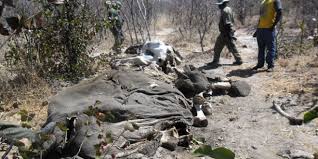Government to Work with Stakeholders to Improve Workplace Safety: Goche
By Byron Mutingwende Nicholas Goche, Minister of Public Service, Labour and Social Welfare has said much needs to be done in order to prevent workplace accidents and deaths. Goche made the remarks while officially opening a workshop on safety and…
MDC-T Former Councillor Bande Sucked in Epworth Illegal Stand Allocations
By Samuel Takawira Perusing the accounts of the demolition of ‘illegal’ structures in the Epworth and Chitungwiza in the media and moreso the social media, one is bound to imagine that the citizens are the sole cause of these demolitions….
Limited Improvement of Health and Education Service Provision: ZIMSTAT
Byron Mutingwende Zimbabwe is registering some incremental gain in providing health to women and children, it has emerged. This came to fore during the presentation of key findings of the 2014 Multiple Indicator Cluster Survey (MICS) held at the United…
VP Mujuru Pledges Government Commitment Towards Mainstreaming Disability Rights
Byron Mutingwende Persons with disabilities have made calls for realization of their rights by advocating for an environment that promotes their full inclusion and active participation as equal members of the family, community and society. This came out during the…
United States Provides over $300,000 for Elephant and Rhino Conservation in Zimbabwe this Year
Harare, September 18th 2014: In 2014, the United States Fish and Wildlife Service (USFWS) provided over $300,000 for elephant and rhinoceros conservation in Zimbabwe, pushing the amount that the agency has donated in Zimbabwe since 2002 over the $1 million…
Child Prostitution Cause for Concern in Epworth
By Prince Njagu The grueling effect of the biting economy in Zimbabwe is forcing many young girls in the satellite town of Epworth to turn to prostitution for survival. The girls as young as 12 some of whom are orphaned…
Tsholotsho; After the Floods and Still No Change
BY NKULULEKO SIBANDA FOR an ordinary farmer, whether commercial or subsistence, the winds that blew on the morning of July 27, 2014 signaled good weather patterns that could eventually lead to the much anticipated rains come the normal rainy season…
Homeless and Living on the Edge in Harare
As one draws near the Mbare Musika bus terminus, the sound of groaning and hissing buses start to grow louder and louder.Each time a bus screeches to a stop, a mob of excited vendors outstrip each other racing to the grating…





